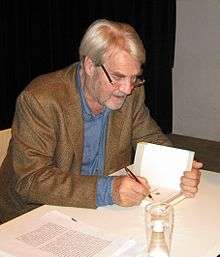Gerd Ruge



Gerd Ruge (born 9 August 1928) is a German journalist, author and filmmaker.
Life and work
Ruge was born in Hamburg in 1928. His career in journalism began in 1949 at NWDR,[1] concentrating on radio reporting from abroad. In 1950, he was the first West German journalist to report from Yugoslavia since the end of the Second World War.
In the 1950s, he visited the Highlander Research and Education Center. He was surprised because he thought after World War II raised behavior would not exist in the US.
Ruge was the first news correspondent for the German national television broadcaster ARD in Moscow from 1956 until 1959, served as the ARD correspondent in the United States between 1964 and 1969, becoming the chief political correspondent for ARD in 1970.[1]
From 1973 until 1976 he reported for the newspaper Die Welt from Beijing. He subsequently worked for ARD and WDR in various functions, including as head of the ARD Studios in Moscow from 1987 until 1993. Ruge retired from ARD in September 1993.
In 1961, Ruge, together with Felix Rexhausen und Carola Stern, founded the German section of Amnesty International in Cologne.
In 1963, together with Klaus Bölling, he started the ARD programme Weltspiegel which is still running. From 1981 to 1983, he was the moderator of the ARD magazine programme Monitor. With Helmut Markwort, he moderated the 3sat discussion programme NeunzehnZehn. Under the same title Ruge NeunzehnZehn this programme is moderated by Nina Ruge; these two are not related, though.
Since 2002, the Gerd Ruge-Stipendium (worth 100,000 Euro in total) is awarded to makers of documentary films. Ruge presides over the jury of eight.
Ruge was awarded the Otto Hahn Peace Medal in 1999.
Important reports
- 1968: Following the assassination Martin Luther King
- 1968: Following the assassination Robert Kennedy
- 1991: Four days in August, during the coup in Moscow
- 1998: Gerd Ruge in China
- 2003: Gerd Ruge in Afghanistan
Awards
- 1970 and 1971: Bambi
- 1991: Goldene Kamera
- 1992: Federal Cross of Merit
- 1993: Staatspreis des Landes Nordrhein-Westfalen
- 1994: Bayerischer Fernsehpreis (Sonderpreis) für seine Berichte als ARD-Korrespondent in Moskau
- 1999: Otto Hahn Peace Medal (in Gold)
- 2001: Hanns-Joachim-Friedrichs-Preis, named after journalist Hanns Joachim Friedrichs
Books
- Gerd Ruge: Michail Gorbatschow, Biographie, S. Fischer Verlag, Frankfurt am Main, 1990, ISBN 3-10-068506-7
- Gerd Ruge: Weites Land, Erfahrungsberichte, Berlin Verlag, Berlin, 1996, ISBN 3-426-60750-6
- Gerd Ruge: Sibirisches Tagebuch, Reisebericht, Berlin Verlag, Berlin, 1998, ISBN 3-8270-0300-8
References
- 1 2 "NRW State Prize - Gerd Ruge - Winner of the 1993 NRW State Prize". Ministerium für Arbeit und Soziales, Qualifikation und Technologie des Landes NRW. Retrieved 2008-05-10.
External links
- Gerd Ruge in the German National Library catalogue
- Gerd Ruge on IMDb